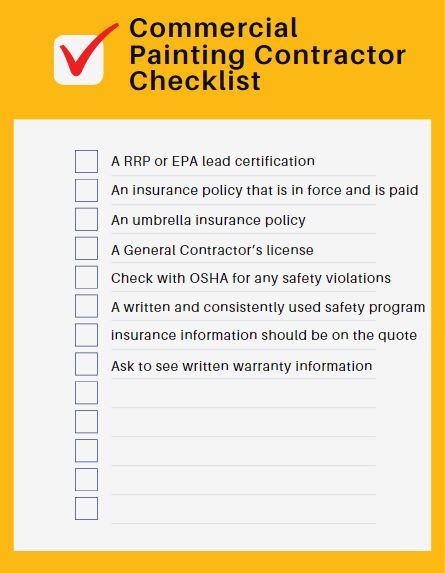Massachusetts licensing & certifications for Commercial Painters
Chapter 8
Chapter 8: Licenses, certifications, insurance and safety protocols a Commercial Painting Contractor needs in Massachusetts.
Because you want to ensure safety on the job site, you’ll need to make sure your Boston area Commercial Painter has the correct licenses and insurance to work in Massachusetts and New England.
Download this PDF checklist that you can print so you can ensure your Commercial Painting Contractor has:

- An RRP or EPA lead certification if they are working on buildings that were built before 1978 or are known or suspected to contain lead paint. This lead certification is especially important in older buildings where children will spend time, such as schools and daycares so the paint chips are well-contained and don’t cause harm to a young child.
- An insurance policy that is in force and is paid up (hint: some smaller painters don’t pay their insurance bill, so while they have a Certificate of Insurance to show you, they may have no actual insurance!).
- Be sure you receive the insurance certificate emailed directly from the insurance company and ask to be added as “additional insured” to the policy. This ensures the painter doesn’t tampered with the certificate and indicates the policy is in full force.
- The insurance certificate should list both a General Liability policy and a Worker’s Compensation policy. If the painter does not carry Worker’s Compensation, this is a red flag not to hire them.
- An umbrella insurance policy that is high enough to cover damages caused by the Commercial Painting Contractor. Umbrella policies add coverage to the painters’ other policies up to the amount on the umbrella insurance certificate. A good rule of thumb is a $5 million umbrella policy shows that a painter is serious about protecting their Clients, themselves, and their painters.
- A General Contractor’s license if they are doing work for you other than just painting, such as carpentry, replacing windows, building walls or installing drywall, or doing general contracting.
- Check with OSHA for any safety violations the Contractor may have had.
- A written and consistently used safety program (hint: many painting contractors SAY they have a program, but in the day-to-day grind of painting, never actually use them).
- The Boston-area Commercial Painting Contractor’s license and insurance information should be on the quote and/or on their website and easily confirmable.
- If you need a woman-owned business to do the work to meet quotas for your company, ensure that the business is registered in the State of Massachusetts as a Woman-Owned Business.


